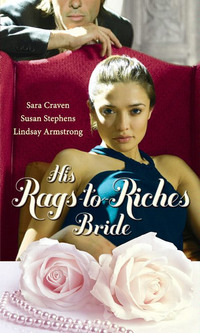
Полная версия
Devil At Archangel

Devil at Archangel
Sara Craven

www.millsandboon.co.uk
Former journalist SARA CRAVEN published her first novel ‘Garden of Dreams’ for Mills & Boon in 1975. Apart from her writing (naturally!) her passions include reading, bridge, Italian cities, Greek islands, the French language and countryside, and her rescue Jack Russell/cross Button. She has appeared on several TV quiz shows and in 1997 became UK TV Mastermind champion. She lives near her family in Warwickshire – Shakespeare country.
TABLE OF CONTENTS
COVER
TITLE PAGE
ABOUT THE AUTHOR
CHAPTER ONE
CHAPTER TWO
CHAPTER THREE
CHAPTER FOUR
CHAPTER FIVE
CHAPTER SIX
CHAPTER SEVEN
CHAPTER EIGHT
ENDPAGE
COPYRIGHT
CHAPTER ONE
‘LOT thirty-four—this fine pair of Staffordshire figures, ladies and gentlemen. Now what am I bid for …?’
The penetrating tones of the auctioneer were suddenly reduced to a subdued murmur as Christina quietly closed the dining room door behind her and began to walk slowly down the flagged passage to the rear of the cottage.
It had been a mistake to stay on for the sale. She realised that now. Mr Frith had warned her that she might find it an upsetting experience, seeing the place she had thought of as home for the past six years being literally sold up around her ears. She should have believed him and moved—not merely out, but away. It was only sentiment that had caused her to remain, she thought. A longing to buy just something, however small, from among her godmother’s treasures to provide her with a reminder of past happiness.
As it was, the prices that the china, furniture and other antiques were fetching had only served as a poignant and disturbing reminder of her own comparative pennilessness. She must have been mad even to think of joining in the bidding, knowing that she would be up against dealers and collectors.
One thing was certain—the Websters would be only too delighted with the results of the sale. She had seen them sitting together at the back of the room, exchanging smiles of triumph as the bidding proceeded. Everything, as far as they were concerned, was going entirely to plan. It was no good telling herself that they had every right to do as they had done. They had made that more than clear already in every interview she’d had with them. Legally, she had no rights at all, she knew, and morality didn’t enter into it.
She walked despondently into the back kitchen. Like everywhere else in the cottage, it had been stripped bare of everything saleable, and the big fitted dresser looked oddly forlorn without its usual complement of bright willow pattern and copperware.
Christina went over to the sink and ran the cold tap, cupping her hand beneath it, so that she could drink. She pressed the few remaining drops of moisture in her palm against her forehead and throbbing temples.
She still could not fully comprehend the suddenness of the change in her life and circumstances. She knew, because Mr Frith had endlessly told her so, that she must think about the future and make some kind of a plan for herself. But what? It seemed for the past six years she had been living in some kind of fool’s paradise. And for that she had to thank Aunt Grace, so kind and affectionate in her autocratic way, and so thoroughly well-meaning towards her orphaned goddaughter, but when it came to it, so disastrously vague.
After all, as Vivien Webster had patronisingly pointed out to her, what more could she expect, when she was not even a blood relation? It was a phrase Mrs Webster was fond of using, often with a delicate handkerchief pressed to her eyes, or the corner of her mouth, and if Christina thought it sounded odd coming from someone who had almost studiously held aloof from Aunt Grace when she was alive, she kept that strictly to herself.
Aunt Grace, after all, had been no fool. She had been well aware that she was regarded as a future meal ticket by her niece and her husband, yet it had made no difference, apparently. Her brief will had left everything unconditionally to Vivien Webster, while Christina who had been her constant companion, run the cottage for her with the spasmodic help of Mrs Treseder from the village, and done all her godmother’s secretarial work for the various charities with which she was connected, had not even warranted a mention.
Not that she had ever expected or wanted anything, she reminded herself. It had always been Aunt Grace who had insisted that she had seen to it that Christina would be well looked after in the event of anything happening to herself, although she had never specified what form this care would take. She had said so over and over again, especially when Christina had tried to gain some measure of independence by suggesting that she took a training course, or acquired some other type of qualification.
‘There’s no need for that, my dear,’ Miss Grantham would remark bracingly. ‘You’ll never want, I promise you. I shall see to that, don’t worry.’
And yet, Christina thought wryly, here she was without a job, a home or any kind of security—not even allowed so much as a breathing space in her old home to gather her wits and formulate some kind of plan for the future. She gave a little painful sigh and stared out of the window at the small vegetable garden where she and Aunt Grace had spent so many back-aching hours up to the time of that last but fatal illness.
Not for the first time she wondered if Aunt Grace had really known just how ill she had been. Certainly she had robustly rejected all suggestions that she looked tired, and all urgings to rest more and conserve her energy in the months preceding her death. In fact she had seemed to drive herself twice as hard, as if she guessed that she might not have very much time left, and she had driven Christina hard too.
Christina gave a slight grimace. She had a whole range of accomplishments to put in an advertisement—‘Capable girl, nineteen, can cook a little, garden a little, type a little, nurse a little …’ The list seemed endless. Yet she had to acknowledge that she was a Jill of all trades and actually mistress of none. Had she anything to offer an employer more stringent than Aunt Grace had been? This was her chief worry.
Up to now, of course, her not always expert services had been accepted, if not always with entire good humour, but she could not expect that a stranger would be prepared to make the same allowances for her.
She had been whisked off to live with her godmother when her own mother, widowed while Christina was still a baby, had herself succumbed to a massive and totally unexpected heart attack. Christina had stayed on at the same school, aware for the first time that the fees were being paid, as they had always been, by Aunt Grace. When she was sixteen, her godmother had commanded her to leave school to ‘keep her company’ and she had perforce to abandon any idea of further study and obey. Not that it had been such a bad life, Christina thought, sudden nostalgia tightening her throat. She had liked the small rather cosy village community of which Aunt Grace had been so active a member. She had learned to appreciate the changing seasons with a new and heightened awareness, and had come to enjoy the pattern of her year and its traditional festivities without any particular yearning for the discos and parties being enjoyed by her contemporaries.
Keeping Aunt Grace company had not always been easy. Her godmother was an imperious woman belonging to a very different generation. She did not believe in Women’s Lib, even in its mildest form, and it was her openly expressed view that every woman needed a man to look after her and protect her from what she darkly referred to as ‘folly’, though she invariably refused to be more specific.
Her own form of male protection, for she had never married, came in the substantial shape of Mr Frith, her family solicitor, whose advice she followed almost religiously on every problem, except apparently in one instance—that of Christina’s future. Mr Frith told Christina frankly after the funeral and the reading of the will that he had tried on a number of occasions to persuade Miss Grantham to alter her will and make some provision for her, but without success.
‘She pretended she couldn’t hear me,’ he told Christina regretfully, and Christina, who had often been subjected to the same treatment herself when presenting Aunt Grace with some unpalatable piece of information, had to sympathise with him.
All Christina could surmise was that Aunt Grace had intended to make provision for her, but had not been able to decide what form it should take. And now, of course, it was too late and there was no point in wondering what this might have been.
It was clear from the very start that Mrs Webster was not prepared to be magnanimous in any way. Christina was merely an encumbrance to be shed as soon as possible, and she did not even pretend a polite interest in the future of the girl who had been her aunt’s ward. Christina was allowed to infer that Mrs Webster thought she was extremely lucky to have lived in such comfort rent-free for so long, and that it would do her no harm to stand on her own feet for a change. Nor did she show any great interest in the cottage or its contents. She did not want to give up her life in London for a country existence, and she made it plain she was only interested in converting her inheritance into hard cash as soon as possible.
Christina had hoped forlornly that the Websters might want to retain the cottage as a weekend home, and might be prepared to employ her as a caretaker in their absence, but she was soon disabused of that notion. And when she quietly asked if Mrs Webster knew of anyone who might need a companion to perform the sort of duties that Aunt Grace had demanded, Mrs Webster had merely shrugged her shoulders and talked vaguely of agencies and advertisements.
Mr Frith and his wife had been extremely kind, and had promised to provide her with suitable references when the time came. They had even invited her to stay with them when it became clear that she would have to move out of the cottage without delay so that it could be auctioned with the contents. But Christina had refused their offer. Perhaps, she had told herself, the Websters had a point and it was time she did try to gain some independence. After all, she couldn’t be cushioned against life forever. There were other places outside this little village and outside her total experience, and she would have to find them.
It was taking the first step that was always the hardest, she decided. Her own first step had been a room in the village’s one hotel, but she knew this could not be a permanent arrangement. Her small stock of funds would not permit it, for one thing, and besides, it would soon be high summer and Mrs Thurston would need the accommodation for the casual tourists passing through the village on the way to the coast. As it was, the temporary arrangement suited them both.
Once the auction was over, there would be nothing to hold her here. It was an odd sensation. She felt as if a gate had closed behind her, and she stood alone in the centre of an unfamiliar landscape, unknowing which way to turn.
It was a lonely feeling and she felt tears prick momentarily at the back of her eyelids. It had occurred to her more than once that Aunt Grace might have expected her to marry and find sanctuary that way. Certainly she had always been quite encouraging when any of the local young men showed even a random interest in Christina. But such dates as she had had were few and far between. Christina had felt uncomfortably on several occasions as though her escorts were doing her some kind of favour, and she would not have been human if she had not resented this. After all, her mirror showed that she was not unattractive with her long straight fall of honey-blonde hair, and her thickly lashed grey-green eyes. In deference to Aunt Grace’s stated preferences, she had never worn extravagantly trendy clothes and she had wondered sometimes whether outsiders considered her dowdy.
Since Aunt Grace’s death, it had occurred to her that the attitude of some of the boys who had dated her might have sprung from the fact that they knew how poor her financial prospects were. It was an unpleasant thought, but it had to be faced. Many of the local families were well-to-do and would expect any future daughter-in-law to be drawn from approximately the same financial background and social standing as themselves. They might be kind, but they would not lose sight of the fact that she was only Aunt Grace’s companion.
It was a depressing thought and one she did not feel too inclined to pursue. She glanced at her wristwatch. The sale was barely half over as yet, but she thought it might be best if she slipped away. For one thing, she wanted to avoid another encounter with the Websters, who would be bound to inquire in carrying voices if she had managed to find another job yet. Christina sighed. She did not want to have to admit the humiliating truth—that her few diffident applications for posts so far had not even reached the stage of being invited for an interview.
Besides, she still had the rest of the day in front of her. She could catch the afternoon train to London perhaps and go round some of the agencies that Mrs Webster had mentioned. Perhaps in cases like hers, the personal approach was best. Anyway, time was growing short and she had to find some means of earning her living before her small savings ran out altogether. She had to shake herself out of this painful dream world and take up her life again. There was nothing here for her now, and maybe it had done her no harm to be convinced of the fact.
She took one last and rather sad look at the garden and turned away towards the door.
Then she saw that she was not alone and a startled involuntary ‘Oh!’ broke from her lips. She had not the slightest inkling of any approach, and there was something in the stance of the woman in the doorway that suggested rather uncomfortably to Christina that she had been there quietly for quite some time.
She was not a tall woman, but she had a definite presence, aided by the fact that she was exquisitely dressed in a hyacinth-blue Italian knitted suit. Her shoes and bag looked handmade, and she leaned on a slender ebony cane with a silver handle.
‘Miss Bennett?’ Her voice was calm and low-pitched with more than a trace of some foreign accent.
Christina hesitated for some reason that she could not herself have defined. Then ‘Yes,’ she acknowledged in a low voice. ‘But I’m afraid I don’t know …’
‘As you say, we have never met.’ The other woman smiled slowly, revealing white and even teeth. Yet I assure you, mademoiselle, that I do not in the least regard you as a stranger. In many ways, I feel we are old friends.’ She gave another faint smile at the bewildered expression on Christina’s face.
‘I see that I must explain myself more fully. I am Marcelle Brandon, mademoiselle. Did your godmother never speak of me to you?’
‘Never, as far as I can remember,’ Christina told her honestly. ‘You—you were a friend of hers?’
She found it difficult to credit in many ways even as she spoke. Aunt Grace had been so thoroughly English—never even journeying abroad as far as Christina knew. It was impossible to imagine how she could have struck up any kind of relationship with this rather exotic-looking stranger.
The other inclined her head. ‘We were at school together—also my sister Madeleine. Your godmother never spoke of her either?’
Christina swallowed. ‘No. I don’t think she ever mentioned her schooldays. It always seemed that any friends she had were here in this village.’
‘Latterly that would have been true.’ Mrs Brandon shifted her weight slightly and Christina saw with compassion that she was in pain. But it was only a fleeting impression, and when the bright dark eyes met hers again, they were calm. ‘Yet we corresponded for many years. I last heard from her some eighteen months ago.’
She glanced around. ‘I regret that I am unable to stand for long periods and there does not appear to be a chair …’
‘No, everything went for the sale.’ Try as she would, Christina could not keep that note of desolation completely out of her voice.
‘Then perhaps you know of some more comfortable surroundings where we could talk—where there will not be so many memories, hein?’
Christina paused. She could see absolutely no reason why this old friend of Aunt Grace should want to talk to her, apart from sheer kindness of heart in wishing to comfort her in her bereavement. But this she could not quite believe, although she would have been at a loss to explain why. The strongest impression she got from Mrs Brandon was one of cool self-containment. It was hard to imagine her wasting time on meaningless gestures of sympathy. She wondered why she had come now instead of for the funeral, and who had informed her of Aunt Grace’s death in the first place. She had had the task of passing on the sad news to Aunt Grace’s friends and acquaintances and she knew quite well she had not written to anyone called Brandon. Perhaps Mrs Brandon was here at the auction because she too had wished to buy some last souvenir of her friend, but again this seemed to be out of character.
But why am I saying that? she thought, appalled. I’ve only just met her. She’s a stranger to me. I shouldn’t be attributing motives or anything else to her on first meeting.
She smiled over-brightly, trying to compensate for her own guilty feelings.
‘There is the place where I’m staying,’ she said, a trace of doubt creeping into her voice. Somehow she could not visualise Marcelle Brandon among the faded tapestry covers and mock horse brasses of Mrs Thurston’s sitting room at the Bay Horse.
‘But that would be ideal,’ her visitor said smoothly, scooping up Christina’s mental arguments and dismissing them before they could find utterance. ‘Perhaps there might also be some coffee.’
‘I’m not sure about that,’ Christina admitted. ‘There’ll certainly be tea.’
And tea there was, accompanied by some rather powdery scones. Marcelle Brandon appeared to bear up philosophically under this, but Christina noticed that she barely touched her cup and merely crumbled one of the scones on her plate. Although she had said she wanted to talk, she seemed in no hurry to break the silence that had sprung up between them. She seemed, Christina thought idly, a thousand miles away, her mind fixed on some interior vision, not altogether pleasant. Then she reproached herself for an over-active imagination. After all, this woman had been a close friend of her godmother’s. It was natural that she should seem a little withdrawn. It could not be a happy experience for her to be here now, knowing that they would never meet again.
She cleared her throat. ‘You were very fond of my godmother, madame?’
Mrs Brandon seemed to return with a start to her present surroundings. She lifted one elegantly shaped eyebrow. ‘Naturellement, or I should hardly be here.’
‘No.’ Christina flushed slightly. Then she took her courage in both hands. ‘Forgive me, madame, but I don’t really understand why you have come.’ She swallowed. ‘I—I suppose it’s none of my business, but …’
But the half-expected snub was not forthcoming. Instead Mrs Brandon smiled slightly.
‘Au contraire. It is precisely on your business that I have come. Your godmother wrote to me when she first suspected she might be seriously ill. She never mentioned this to you? No, I thought not. She was concerned as to what might become of you when she died as she was aware that any financial provision she might make in her will would in all probability be contested in the courts, and this would be both costly and unpleasant for you. Her niece—is it not?—plainly resented you already and would have accused you of exerting undue influence on your godmother if she had made you a bequest as she wished.’
Christina nodded dully. ‘Mrs Webster doesn’t like me—not that we’ve met very often. She hardly came near Aunt Grace when she was alive …’ She paused, aware that she might be giving away too much, but Mrs Brandon gave an understanding nod.
‘You are very young, ma chère—Christina, is it not? And you do not yet fully comprehend the way of the world.’
‘If it’s the Websters’ way, I don’t think I want to comprehend it,’ Christina flashed back, then bit her lip.
Mrs Brandon laughed and leaned back in her chair, taking a cigarette from her bag and fitting it into a silver holder. ‘Bon,’ she approved, a little mockingly. ‘I am glad you are not wholly lacking in spirit. You are such a little pale thing. I did not expect …’ She broke off and lit her cigarette. Blowing out a cloud of fragrant smoke, she regarded Christina through half-closed eyes. ‘Tell me, ma chère, what plans have you made? You cannot, one would imagine, intend to stay here?’
‘Oh, no.’ Christina shook her head. ‘That—that would be out of the question, even if I wanted to. I have to get a job.’
‘Very commendable. Have you anything in mind?’
Christina hesitated. It was humiliating to have to admit the truth—that with her lack of qualification she would have to take what she could get and be thankful.
‘Because, if not, I have a plan to put to you,’ Mrs Brandon continued as if she had not noticed the awkward little pause. ‘I myself am looking for a secretary/companion and I think you would suit me very well, if you were willing.’
Christina set her tea cup back on the tray with a hand that shook slightly.
‘It’s very kind of you, madame,’ she said quietly. ‘But I’m sure I’ll be able to find something. I—I don’t need charity, however kindly meant.’
‘You think I offer charity? Then you do not know me very well. I do not offer a sinecure, my child. I suffer from arthritis, as you have seen, and I am not a patient sufferer—my temper has never been of the sweetest. Also there is the isolation. We have none of the entertainments or amusements that young people of your age seem to expect nowadays—no discothèques or night clubs.’
In spite of herself, Christina had to smile. ‘I should hardly miss that kind of thing,’ she returned drily. ‘The Swinging Seventies seem to have passed me by up to now.’ She sent the older woman an inquiring glance. ‘You say your home is isolated, madame? Where do you live? I gather it’s somewhere in France, but …’
Mrs Brandon shook her head. ‘I have never lived in France. I was born, as was Madeleine, my sister, on Martinique in the West Indies. We both attended a convent school in England, and that was where we met your godmother. When I married, I went to live on Ste Victoire, another island, though not so large as Martinique and belonging to the British. In fact, my husband and his brother, who is now dead, owned the greater part of it, and our family still lives at Archangel.’
‘Archangel?’ Christina’s face was alive with interest. ‘What an unusual name for a house.’
‘Yes—and the story behind it is also unusual. It is not merely a house, you understand. There is also a plantation. And because so much of it is private property, Ste Victoire has not been developed and spoiled as so many others have been. I think you would like it there.’
Christina swallowed hard, trying to hold on to reality. Was this really happening to her? Was she actually being offered a job on a Caribbean island—something she had never contemplated even in her wildest dreams? But in spite of her inner excitement, a small voice of sanity still prevailed.











